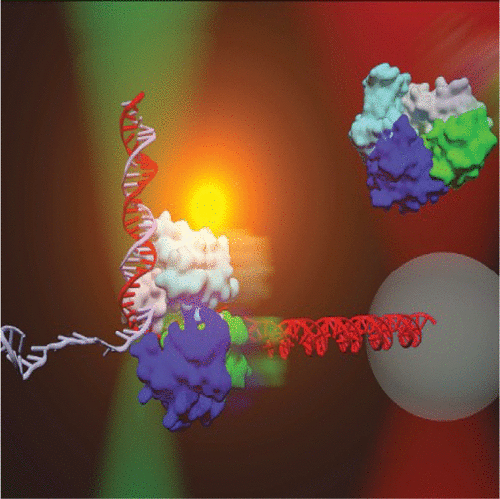当前位置:
X-MOL 学术
›
Chem. Rev.
›
论文详情
Our official English website, www.x-mol.net, welcomes your
feedback! (Note: you will need to create a separate account there.)
Single-Molecule Analysis and Engineering of DNA Motors.
Chemical Reviews ( IF 51.4 ) Pub Date : 2019-10-29 , DOI: 10.1021/acs.chemrev.9b00361 Sonisilpa Mohapatra , Chang-Ting Lin , Xinyu A Feng , Aakash Basu , Taekjip Ha 1
Chemical Reviews ( IF 51.4 ) Pub Date : 2019-10-29 , DOI: 10.1021/acs.chemrev.9b00361 Sonisilpa Mohapatra , Chang-Ting Lin , Xinyu A Feng , Aakash Basu , Taekjip Ha 1
Affiliation

|
Molecular motors are diverse enzymes that transduce chemical energy into mechanical work and, in doing so, perform critical cellular functions such as DNA replication and transcription, DNA supercoiling, intracellular transport, and ATP synthesis. Single-molecule techniques have been extensively used to identify structural intermediates in the reaction cycles of molecular motors and to understand how substeps in energy consumption drive transitions between the intermediates. Here, we review a broad spectrum of single-molecule tools and techniques such as optical and magnetic tweezers, atomic force microscopy (AFM), single-molecule fluorescence resonance energy transfer (smFRET), nanopore tweezers, and hybrid techniques that increase the number of observables. These methods enable the manipulation of individual biomolecules via the application of forces and torques and the observation of dynamic conformational changes in single motor complexes. We also review how these techniques have been applied to study various motors such as helicases, DNA and RNA polymerases, topoisomerases, nucleosome remodelers, and motors involved in the condensation, segregation, and digestion of DNA. In-depth analysis of mechanochemical coupling in molecular motors has made the development of artificially engineered motors possible. We review techniques such as mutagenesis, chemical modifications, and optogenetics that have been used to re-engineer existing molecular motors to have, for instance, altered speed, processivity, or functionality. We also discuss how single-molecule analysis of engineered motors allows us to challenge our fundamental understanding of how molecular motors transduce energy.
中文翻译:

DNA电动机的单分子分析和工程。
分子马达是多种酶,它们将化学能转化为机械功,并在其中执行关键的细胞功能,例如DNA复制和转录,DNA超螺旋,细胞内转运和ATP合成。单分子技术已被广泛用于识别分子马达反应循环中的结构中间体,并了解能量消耗中的子步骤如何驱动中间体之间的过渡。在这里,我们回顾了广泛的单分子工具和技术,例如光镊和磁镊子,原子力显微镜(AFM),单分子荧光共振能量转移(smFRET),纳米孔镊子以及增加电池数量的混合技术。可观察的。这些方法可以通过施加力和扭矩以及观察单个电机复合物中的动态构象变化来操纵单个生物分子。我们还回顾了这些技术如何应用于研究各种引擎,例如解旋酶,DNA和RNA聚合酶,拓扑异构酶,核小体重塑剂以及涉及DNA的缩合,分离和消化的引擎。对分子电动机中机械化学耦合的深入分析使得开发人工工程电动机成为可能。我们回顾了诱变,化学修饰和光遗传学等技术,这些技术已被用于重新改造现有的分子马达,以使其具有例如改变的速度,加工性或功能性。
更新日期:2019-10-29
中文翻译:

DNA电动机的单分子分析和工程。
分子马达是多种酶,它们将化学能转化为机械功,并在其中执行关键的细胞功能,例如DNA复制和转录,DNA超螺旋,细胞内转运和ATP合成。单分子技术已被广泛用于识别分子马达反应循环中的结构中间体,并了解能量消耗中的子步骤如何驱动中间体之间的过渡。在这里,我们回顾了广泛的单分子工具和技术,例如光镊和磁镊子,原子力显微镜(AFM),单分子荧光共振能量转移(smFRET),纳米孔镊子以及增加电池数量的混合技术。可观察的。这些方法可以通过施加力和扭矩以及观察单个电机复合物中的动态构象变化来操纵单个生物分子。我们还回顾了这些技术如何应用于研究各种引擎,例如解旋酶,DNA和RNA聚合酶,拓扑异构酶,核小体重塑剂以及涉及DNA的缩合,分离和消化的引擎。对分子电动机中机械化学耦合的深入分析使得开发人工工程电动机成为可能。我们回顾了诱变,化学修饰和光遗传学等技术,这些技术已被用于重新改造现有的分子马达,以使其具有例如改变的速度,加工性或功能性。

















































 京公网安备 11010802027423号
京公网安备 11010802027423号